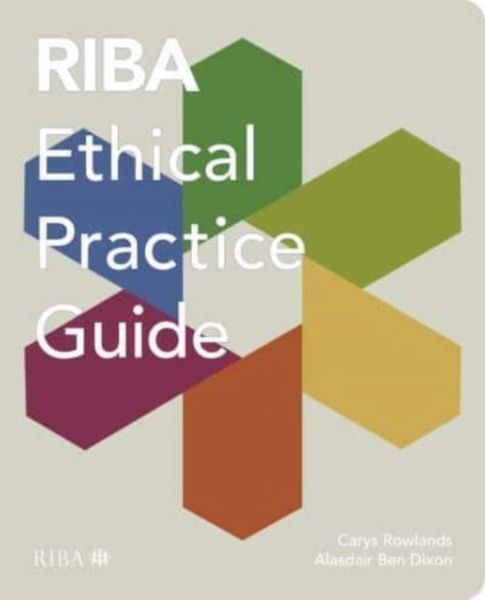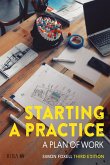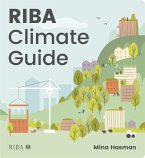- Broschiertes Buch
- Merkliste
- Auf die Merkliste
- Bewerten Bewerten
- Teilen
- Produkt teilen
- Produkterinnerung
- Produkterinnerung
Architects play a pivotal role in society - this is a practical guide for ethical practice in architecture that acts as a knowledge base for all architects.
Andere Kunden interessierten sich auch für
![Starting a Practice Starting a Practice]() Simon FoxellStarting a Practice48,99 €
Simon FoxellStarting a Practice48,99 €![Thrive Thrive]() Sumita SinghaThrive48,99 €
Sumita SinghaThrive48,99 €![Architect: The evolving story of a profession Architect: The evolving story of a profession]() Eleanor JolliffeArchitect: The evolving story of a profession45,99 €
Eleanor JolliffeArchitect: The evolving story of a profession45,99 €![Photography for Architects Photography for Architects]() Martine Hamilton KnightPhotography for Architects46,99 €
Martine Hamilton KnightPhotography for Architects46,99 €![Architects After Architecture Architects After Architecture]() Architects After Architecture41,99 €
Architects After Architecture41,99 €![RIBA Climate Guide RIBA Climate Guide]() Mina HasmanRIBA Climate Guide55,99 €
Mina HasmanRIBA Climate Guide55,99 €![Design your life Design your life]() Clare NashDesign your life42,99 €
Clare NashDesign your life42,99 €-
-
-
Architects play a pivotal role in society - this is a practical guide for ethical practice in architecture that acts as a knowledge base for all architects.
Hinweis: Dieser Artikel kann nur an eine deutsche Lieferadresse ausgeliefert werden.
Hinweis: Dieser Artikel kann nur an eine deutsche Lieferadresse ausgeliefert werden.
Produktdetails
- Produktdetails
- Verlag: RIBA Publishing
- Seitenzahl: 184
- Erscheinungstermin: 1. Juli 2023
- Englisch
- Abmessung: 208mm x 168mm x 17mm
- Gewicht: 464g
- ISBN-13: 9781914124723
- ISBN-10: 1914124723
- Artikelnr.: 67514340
- Herstellerkennzeichnung
- Produktsicherheitsverantwortliche/r
- Europaallee 1
- 36244 Bad Hersfeld
- gpsr@libri.de
- Verlag: RIBA Publishing
- Seitenzahl: 184
- Erscheinungstermin: 1. Juli 2023
- Englisch
- Abmessung: 208mm x 168mm x 17mm
- Gewicht: 464g
- ISBN-13: 9781914124723
- ISBN-10: 1914124723
- Artikelnr.: 67514340
- Herstellerkennzeichnung
- Produktsicherheitsverantwortliche/r
- Europaallee 1
- 36244 Bad Hersfeld
- gpsr@libri.de
Carys Rowlands is a barrister (unregistered) and Head of Registration & CPD at RICS. She is former Head of Professional Standards at the RIBA. Carys' work for the RIBA involved professional conduct issues, dispute resolution services, specialist accreditation, conservation and heritage, and ethics in architectural practice. Carys has written publications in collaboration with the UN Global Compact, including Ethics in Architectural Practice. She was the staff lead for the RIBA Ethics and Sustainable Development Commission and has delivered CPD on ethical practice for the RIBA and independently for universities and schools of architecture. Alasdair Dixon is a founding Partner of Collective Works, co-ordinator of the Architects Climate Action Network and a Trustee of Architecture for Humanity UK. He has long held a commitment to finding a better way for architects to balance the needs of the wider world with the needs of their clients & stakeholders. During his career he has advised on ethical issues within a large established practice, an architectural charity and in the day to day running of a small practice.
Intro: Ethics in practice
History & definitions
Ethics not morals
Ethics and culture
Virtue Ethics / Social Contract Ethics / Duty Ethics / Utilitarian Ethics
Defining behaviours
Codes, Regulations, Sanctions and Best Practice
The Public Interest
How it is defined and who is responsible
Professional ethics
Recognising an ethical issue
Ethical processes and techniques
Whistleblowing
The 6 duties Chapter 1
Duty to the Wider World
Legal obligations
The Codes of Conduct and Practice
The Climate and Biodiversity emergency
Sustainable and Regenerative design (mitigation / adaptation)
Supply Chains and Resource Use
Rights of Nature
Whole life performance
Net Zero
Openness & transparency
Tools & techniques
Dilemma
Challenging the brief Chapter 2
Duty to Society and the End User
Legal obligations (tort & company law)
Building Regs, Housing Standards and Planning Policy
The Codes of Conduct and Practice
Specification
Health and safety
Bribery & corruption
Equity, Diversity and Inclusion (including bias & discrimination)
Stakeholder Identification and Engagement
Social Value and Social Responsibility (including link to sustainable development and including embedding throughout organisation)
Regeneration
Evidence
informed design
Inclusive design and inclusive environments
Wellbeing
Accuracy & truthfulness
Rights of Future Generations
Tools & techniques
Dilemma
Affordable housing provision Chapter 3
Duty to those Commissioning Services
Legal obligations
The Codes of Conduct and Practice
The client relationship
Conflicts of interest
Competence and diligence
Lay clients
Experienced private clients
Public Sector clients
Confidentiality
Time, cost, quality
Communication and complaints
Stewardship and aftercare
Learning and improvement
Tools & techniques
Dilemma
Client's best interest Chapter 4
Duty to those in the workplace
Legal obligations
The Codes of Conduct and Practice
Company culture
Respecting colleagues
Managing practice and work environment
Training and development
Health, safety and wellbeing
Equity, Diversity and Inclusion (including the RIBA EDI Policy Guide)
Modern Slavery
Tools & techniques
Dilemma
Workplace Chapter 5
Duty to the Profession
The Codes of Conduct and Practice
Reputation & Value
Respecting previous appointments
Copyright & Credit
Whistleblowing and disclosure
Knowledge sharing
Research, Data Ethics, POE & Building Performance
Contributing to and representing the profession
Equity, Diversity and Inclusion (including the RIBA Inclusion Charter)
Tools & techniques
Dilemma
A competition Chapter 6
Duty to Oneself
The Codes of Conduct and Practice
Principles and values
Competence
Accountability
Continuing Professional Development
Evaluation, reflection and positionality
Pro Bono work
Bribery & corruption
Tools & techniques
Dilemma
A conflict of interest Conclusion
Resolving Ethical Issues
Core values
Decision making
Lifelong learning
Independence
Leadership
Advocacy
Resources and toolkits
Reviews and feedback
History & definitions
Ethics not morals
Ethics and culture
Virtue Ethics / Social Contract Ethics / Duty Ethics / Utilitarian Ethics
Defining behaviours
Codes, Regulations, Sanctions and Best Practice
The Public Interest
How it is defined and who is responsible
Professional ethics
Recognising an ethical issue
Ethical processes and techniques
Whistleblowing
The 6 duties Chapter 1
Duty to the Wider World
Legal obligations
The Codes of Conduct and Practice
The Climate and Biodiversity emergency
Sustainable and Regenerative design (mitigation / adaptation)
Supply Chains and Resource Use
Rights of Nature
Whole life performance
Net Zero
Openness & transparency
Tools & techniques
Dilemma
Challenging the brief Chapter 2
Duty to Society and the End User
Legal obligations (tort & company law)
Building Regs, Housing Standards and Planning Policy
The Codes of Conduct and Practice
Specification
Health and safety
Bribery & corruption
Equity, Diversity and Inclusion (including bias & discrimination)
Stakeholder Identification and Engagement
Social Value and Social Responsibility (including link to sustainable development and including embedding throughout organisation)
Regeneration
Evidence
informed design
Inclusive design and inclusive environments
Wellbeing
Accuracy & truthfulness
Rights of Future Generations
Tools & techniques
Dilemma
Affordable housing provision Chapter 3
Duty to those Commissioning Services
Legal obligations
The Codes of Conduct and Practice
The client relationship
Conflicts of interest
Competence and diligence
Lay clients
Experienced private clients
Public Sector clients
Confidentiality
Time, cost, quality
Communication and complaints
Stewardship and aftercare
Learning and improvement
Tools & techniques
Dilemma
Client's best interest Chapter 4
Duty to those in the workplace
Legal obligations
The Codes of Conduct and Practice
Company culture
Respecting colleagues
Managing practice and work environment
Training and development
Health, safety and wellbeing
Equity, Diversity and Inclusion (including the RIBA EDI Policy Guide)
Modern Slavery
Tools & techniques
Dilemma
Workplace Chapter 5
Duty to the Profession
The Codes of Conduct and Practice
Reputation & Value
Respecting previous appointments
Copyright & Credit
Whistleblowing and disclosure
Knowledge sharing
Research, Data Ethics, POE & Building Performance
Contributing to and representing the profession
Equity, Diversity and Inclusion (including the RIBA Inclusion Charter)
Tools & techniques
Dilemma
A competition Chapter 6
Duty to Oneself
The Codes of Conduct and Practice
Principles and values
Competence
Accountability
Continuing Professional Development
Evaluation, reflection and positionality
Pro Bono work
Bribery & corruption
Tools & techniques
Dilemma
A conflict of interest Conclusion
Resolving Ethical Issues
Core values
Decision making
Lifelong learning
Independence
Leadership
Advocacy
Resources and toolkits
Reviews and feedback
Intro: Ethics in practice
History & definitions
Ethics not morals
Ethics and culture
Virtue Ethics / Social Contract Ethics / Duty Ethics / Utilitarian Ethics
Defining behaviours
Codes, Regulations, Sanctions and Best Practice
The Public Interest
How it is defined and who is responsible
Professional ethics
Recognising an ethical issue
Ethical processes and techniques
Whistleblowing
The 6 duties Chapter 1
Duty to the Wider World
Legal obligations
The Codes of Conduct and Practice
The Climate and Biodiversity emergency
Sustainable and Regenerative design (mitigation / adaptation)
Supply Chains and Resource Use
Rights of Nature
Whole life performance
Net Zero
Openness & transparency
Tools & techniques
Dilemma
Challenging the brief Chapter 2
Duty to Society and the End User
Legal obligations (tort & company law)
Building Regs, Housing Standards and Planning Policy
The Codes of Conduct and Practice
Specification
Health and safety
Bribery & corruption
Equity, Diversity and Inclusion (including bias & discrimination)
Stakeholder Identification and Engagement
Social Value and Social Responsibility (including link to sustainable development and including embedding throughout organisation)
Regeneration
Evidence
informed design
Inclusive design and inclusive environments
Wellbeing
Accuracy & truthfulness
Rights of Future Generations
Tools & techniques
Dilemma
Affordable housing provision Chapter 3
Duty to those Commissioning Services
Legal obligations
The Codes of Conduct and Practice
The client relationship
Conflicts of interest
Competence and diligence
Lay clients
Experienced private clients
Public Sector clients
Confidentiality
Time, cost, quality
Communication and complaints
Stewardship and aftercare
Learning and improvement
Tools & techniques
Dilemma
Client's best interest Chapter 4
Duty to those in the workplace
Legal obligations
The Codes of Conduct and Practice
Company culture
Respecting colleagues
Managing practice and work environment
Training and development
Health, safety and wellbeing
Equity, Diversity and Inclusion (including the RIBA EDI Policy Guide)
Modern Slavery
Tools & techniques
Dilemma
Workplace Chapter 5
Duty to the Profession
The Codes of Conduct and Practice
Reputation & Value
Respecting previous appointments
Copyright & Credit
Whistleblowing and disclosure
Knowledge sharing
Research, Data Ethics, POE & Building Performance
Contributing to and representing the profession
Equity, Diversity and Inclusion (including the RIBA Inclusion Charter)
Tools & techniques
Dilemma
A competition Chapter 6
Duty to Oneself
The Codes of Conduct and Practice
Principles and values
Competence
Accountability
Continuing Professional Development
Evaluation, reflection and positionality
Pro Bono work
Bribery & corruption
Tools & techniques
Dilemma
A conflict of interest Conclusion
Resolving Ethical Issues
Core values
Decision making
Lifelong learning
Independence
Leadership
Advocacy
Resources and toolkits
Reviews and feedback
History & definitions
Ethics not morals
Ethics and culture
Virtue Ethics / Social Contract Ethics / Duty Ethics / Utilitarian Ethics
Defining behaviours
Codes, Regulations, Sanctions and Best Practice
The Public Interest
How it is defined and who is responsible
Professional ethics
Recognising an ethical issue
Ethical processes and techniques
Whistleblowing
The 6 duties Chapter 1
Duty to the Wider World
Legal obligations
The Codes of Conduct and Practice
The Climate and Biodiversity emergency
Sustainable and Regenerative design (mitigation / adaptation)
Supply Chains and Resource Use
Rights of Nature
Whole life performance
Net Zero
Openness & transparency
Tools & techniques
Dilemma
Challenging the brief Chapter 2
Duty to Society and the End User
Legal obligations (tort & company law)
Building Regs, Housing Standards and Planning Policy
The Codes of Conduct and Practice
Specification
Health and safety
Bribery & corruption
Equity, Diversity and Inclusion (including bias & discrimination)
Stakeholder Identification and Engagement
Social Value and Social Responsibility (including link to sustainable development and including embedding throughout organisation)
Regeneration
Evidence
informed design
Inclusive design and inclusive environments
Wellbeing
Accuracy & truthfulness
Rights of Future Generations
Tools & techniques
Dilemma
Affordable housing provision Chapter 3
Duty to those Commissioning Services
Legal obligations
The Codes of Conduct and Practice
The client relationship
Conflicts of interest
Competence and diligence
Lay clients
Experienced private clients
Public Sector clients
Confidentiality
Time, cost, quality
Communication and complaints
Stewardship and aftercare
Learning and improvement
Tools & techniques
Dilemma
Client's best interest Chapter 4
Duty to those in the workplace
Legal obligations
The Codes of Conduct and Practice
Company culture
Respecting colleagues
Managing practice and work environment
Training and development
Health, safety and wellbeing
Equity, Diversity and Inclusion (including the RIBA EDI Policy Guide)
Modern Slavery
Tools & techniques
Dilemma
Workplace Chapter 5
Duty to the Profession
The Codes of Conduct and Practice
Reputation & Value
Respecting previous appointments
Copyright & Credit
Whistleblowing and disclosure
Knowledge sharing
Research, Data Ethics, POE & Building Performance
Contributing to and representing the profession
Equity, Diversity and Inclusion (including the RIBA Inclusion Charter)
Tools & techniques
Dilemma
A competition Chapter 6
Duty to Oneself
The Codes of Conduct and Practice
Principles and values
Competence
Accountability
Continuing Professional Development
Evaluation, reflection and positionality
Pro Bono work
Bribery & corruption
Tools & techniques
Dilemma
A conflict of interest Conclusion
Resolving Ethical Issues
Core values
Decision making
Lifelong learning
Independence
Leadership
Advocacy
Resources and toolkits
Reviews and feedback








